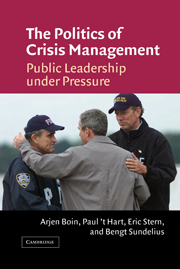Book contents
- Frontmatter
- Contents
- List of figures and table
- Acknowledgments
- 1 Crisis management in political systems: five leadership challenges
- 2 Sense making: grasping crises as they unfold
- 3 Decision making: critical choices and their implementation
- 4 Meaning making: crisis management as political communication
- 5 End games: crisis termination and accountability
- 6 Learning from crises and the politics of reform
- 7 How to deal with crisis: lessons for prudent leadership
- References
- Index
6 - Learning from crises and the politics of reform
Published online by Cambridge University Press: 22 September 2009
- Frontmatter
- Contents
- List of figures and table
- Acknowledgments
- 1 Crisis management in political systems: five leadership challenges
- 2 Sense making: grasping crises as they unfold
- 3 Decision making: critical choices and their implementation
- 4 Meaning making: crisis management as political communication
- 5 End games: crisis termination and accountability
- 6 Learning from crises and the politics of reform
- 7 How to deal with crisis: lessons for prudent leadership
- References
- Index
Summary
Never again!
The post-9/11 era has seen new policies, legal changes, and major institutional innovations that were pushed through the legislative processes at unprecedented speed – in the United States, the European Union, and many other countries. In the US, the so-called Patriot Act was adopted in near unanimity, enacting policy changes in the judicial system, in the handling of immigrants and resident aliens, and in the allocation of government funds for national security and public safety. In a major administrative reorganization effort, various security-related agencies were merged at the stroke of a pen into the vast Department of Homeland Security. The department harbors 170,000 employees and has wide responsibilities in preparing for and dealing with different crisis contingencies.
The European Union learned and changed as well: the scope and depth of cooperation in the field of justice and home affairs have deepened markedly since 9/11 and Madrid. A uniform definition of terrorism has been accepted; extradition rules for potentially terrorism-related crimes have been extended. Police units can track suspected criminals across national borders and, if necessary, act with full authority on foreign soil. Europol, the European agency for police cooperation, has been strengthened, and Eurojust, a similar agency designed to foster cooperation in public prosecution, is in the making. The EU has also accorded higher priority to the protection of its external borders; the new member states receive strong support to upgrade their border-control capabilities.
- Type
- Chapter
- Information
- The Politics of Crisis ManagementPublic Leadership Under Pressure, pp. 115 - 136Publisher: Cambridge University PressPrint publication year: 2005
- 1
- Cited by



